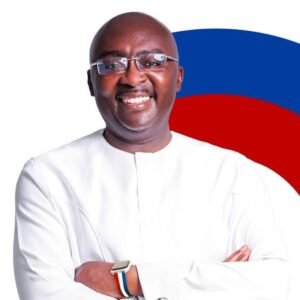
The author
By Kwasi Frimpong
I dedicated the greater part of March in telling the story of the Ghana Media. In this Ghana month, I have sought to take readers through the trajectory of where we have come as a country as far as the inky, microphone and console fraternities are concerned.
I started this whole discussion by giving a general historical overview of the media in Ghana. I gave the history, starting with indigenous media, newspaper, radio, Ghana’s first and only news agency and television.
I then looked at how the media has existed under different political regimes, starting with the colonial era.
In part two of this write-up, I dealt with the media during regimes such as the Nkrumah era, Busia and Limann, the various military regimes and the early part of the forth republic.
Today’s article concludes the whole write-up on the history of the Ghana media.
The NPP regime
The legacy of the first New Patriotic Party (NPP) government was one of a media-friendly government, post-2000. The John Kufuor government, with Nana Addo Dankwa Akufo-Addo as Attorney-General, repealed the Criminal Libel Law, cementing the media pluralism and freedom in the country. By the time the NPP government left office in 2008, more than 120 licences had been granted for private, mostly commercial, radio and television stations.
The government, however worried about the level of unprofessionalism the repeal of the Criminal Libel Law had brought into the profession, drafted a sedition bill. This bill, if it had been promulgated into law, would have impinged on media liberties. However, as some scholars say, it died at birth.
The relationship between the second NPP government, under Nana Akufo-Addo, and the media is one that some people believe has not been best.
A couple of brutalities by state and individual actors, such as the alleged threat on Manasseh Azure Awuni’s life, leading to a temporary “exile”; the killing of Ahmed Suale; the assaults on Latif Iddrisu, David Andoh, Christopher Kevin Asima, a presenter of A1 Radio in Bolgatanga, the three Ghanaian Times journalists by policemen, the modernghana premises and journalists, among others, have all contributed, somewhat, in marring the perfect relationship the NPP in times past had with the media.
Broadcast pluralism
Looking at the various regimes, the focus has so far been mainly on newspapers. This is has been the case because broadcast pluralism in Ghana in itself is largely a new phenomenon, starting only in the nineties. Unlike newspapers, until the fourth republic, broadcast media was solely in the hands of the state. The state controlled radio and television for close to 60 years without any or much private interference.
The liberalisation of Ghana’s airwaves began in in 1996. Some communication scholars believe the Jerry John Rawlings’ NDC government was forced to relinquish its monopoly over the airwaves. The liberalization came after the Independent Media Corporation of Ghana (IMCG) started broadcasting from an unlicensed FM radio station, Radio EYE, in November 1994.
Radio EYE was shut down, shortly after it was opened, by the government and its equipment seized. However, Professor Gadzekpo contends that this compelled the government to set up a committee to draft guidelines and regulations for private broadcast, and by the end of 1996 private broadcast was underway.
Engagement of audiences
Private broadcast started with business entrepreneurs rather than media practitioners becoming owners. This was due to the substantial investments required to establish FM and TV stations and the high licensing fees.
Private FM stations brought to the fore a new style of broadcasting. For instance, phone-in programmes were introduced, thus allowing listeners to participate in discussions on almost any issue. This was driven largely by the need to attract audiences.
Communication scholars say the liberalisation of the airwaves accounted for the outcome of Ghana’s 2000 elections which, for the first time in the country’s history, saw the peaceful alternation of power from an incumbent government to the opposition.
A U S foreign affairs columnist, Thomas Friedman, has asserted that the ability to call into shows, by the masses of often illiterate voters, was largely responsible for the defeat of the incumbent NDC in the 2000 election. While scholars like Jonathan Temin and Daniel A Smith have contested this assertion as “over-romanticizing the role of the media in electoral politics, others such as Professor Gadzekpo say “few will dispute the impact FM radio, aided by widespread mobile telephony, has had in energising the public sphere and in providing contending political candidates and parties with a bigger and more audience participatory platform for debate.”
Some scholars have also credited radio liberalisation with championing a linguistic revival in local languages. Professor Kwesi Yankah, Ghana’s current Minister of State in charge of Tertiary Education, in his paper “Language, and mass media and democracy in Ghana” contends that private radio stations have “helped foreground Ghanaian languages and foster its growth . . . helped to preserve, revive and valorize Ghanaian languages whose use in the media was on the decline.”
Broadcast and newspaper
Broadcast pluralism also brought into the country symbiotic relationship between the broadcast media and newspapers. It is believed that, largely, newspaper stories constituted the basis for radio and TV stories and discussion shows.
Similarly, newspaper is also said to have benefited from broadcast media. Newspaper review shows on both radio and television, for instance, have given newspapers, even the least viable, visibility and relevance because their contents are discussed and amplified beyond their limited circulation to audiences hitherto beyond their reach.
Again, like newspapers, broadcast media has bred its own celebrities. As Professor Gadzekpo puts it, “the high dependence of the medium on newspapers for news and scandal has produced the editor/social commentator, a hybrid media superstar who promotes his/her stories, pushes his/her own political agenda, and amplifies through the airwaves many of the ‘sins’ of the unprofessional press.”
The future of the media
There is no doubt that the media have their own downsides. For example, the inability of some investors in media to have clear plans for recruiting their human resource needs has led to the engagement of, sometimes, inexperienced personnel, leading to immature industry of journalists who are often “long on zeal, but short on professional and ethical values”. Inadequate capital by some media owners leads to a weak media system where journalists largely depend on “soli” (tips from event organisers) to survive.
The media, despite its successes in recent times, is still, largely, fundamentally weak at information gathering and investigative journalism, “partly because they do not have and cannot afford the adequate numbers and qualified staff as well as the resources required to get a good job done”.
The media therefore need to build long-lasting businesses with stronger economic background to survive the test of time. Media organisations have to consider remarkable reforms in the structure and operations of the business of media and in newsroom culture and practices.
Media owners must give priority to training programmes that build the capacity of their staff in order to build a robust industry. Short term training from international organisations, local non-governmental organisations, and media associations concerned with improving media coverage and impact, may have their success, but media organisations themselves must be serious with committing resources to the development of their journalists.
Again, media owners and managers must commit resources to improve media content, hire better qualified professionals and hold them accountable to much higher journalistic standards.
Speed over accuracy must be checked by editors/producers. It is always good to break the right news than to break just the news.
Young journalists must look for good journalists, learn from them and “write from your conscience”.


